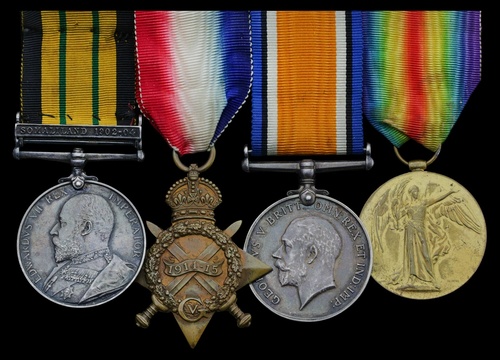
Auction: 20001 - Orders, Decorations and Medals - conducted behind closed doors
Lot: 826
(x) An unusual group of four awarded to Private R. Green, Royal Marine Light Infantry, who was present at the early morning capture of Illig in Italian Somaliland where over 800 men successfully stormed a strongly held clifftop fortification, the Dervishes 'losing heavily'
Africa General Service 1902-56, 1 clasp, Somaliland 1902-04 (R. Green, Pte. R.M., H.M.S. Hyacinth.); 1914-15 Star (CH.6500, Pte. R. Green, R.M.L.I.); British War and Victory Medals (CH.6500 Pte. R. Green. R.M.L.I.), swing mounted as worn on original ribbons, toned, very fine (4)
Richard Green was born on 27 October 1874 at Bedworth, Warwick, the son of William Green of 17 Black Yard, Nun's Street, Derby. A labourer by trade, he attested for the Royal Marine Light Infantry at Derby on 27 January 1892 and was posted as Private to the recruit depot at Walmer, followed by a short spell at Chatham. It was whilst at the latter that he was discovered to be under age on 26 October 1892 after 273 days' service, but having forfeited this time towards his pension Green then began a long and successful career with the R.M.L.I.
Transferred between Pembroke, Chatham and Ganges, Green was posted to the cruiser Hyancith and landed in Italian Somaliland on 21 April 1904, being present at the capture of Illig. The landing is described in a contemporary account published in the Lanceston Examiner:
'Capture of Illig
Bluejackets, Marines and Hampshires - Landing through the surf - Gallantly storming the position - An obstinate defence - Dervishes expelled with heavy losses
The place could not be assailed from the front, so at dawn on the 21st inst. a force was landed for the purpose of storming the position. In the presence of Commander Vuturno (the Italian representative), Rear Admiral George L. Atkinson Willes, at the head of 700 bluejackets and marines from H.M.S.'s Hyacinth, Fox, and Mohawk, and 125 men of the first battalion of the Hampshire Regiment, landed in Gallule River through the surf.
They attacked the towers of Illig on the flank and rear, storming them gallantly and fighting a hard action at close quarters, the defence being obstinate. Ultimately the Dervishes were expelled, losing heavily, and the British and Italian flags were hoisted over Illig.'
The advance landing by 100 seamen under Captain the Honourable H. L. A. Hood, R.N., went largely without a hitch and was unopposed by the enemy. Four seamen lost their rifles in the swell, but the party successfully landed a Maxim gun and secured an area of plateau above the beach. By the next morning, on 21 April 1904, a further 650 officers and men had landed ashore although 'surf was high and all men were wet at least up to the waist and often up to the neck'. Advancing over open ground, at 0800hrs the Illig cliff-top fortifications came into sight. Double stone walls up to 2 metres thick and 3 metres high protected two stone towers that had three floors of firing slits. On seeing the British troops, the Dervishes in the towers blew conch horns and shouted defiance whilst their womenfolk and children ran to safety further along the cliff.
Surging in rushes and supported by three Maxim guns, the seamen scrambled over the walls and entered via the embrasures. Fighting hand to hand, a fellow seaman from Hyancinth, Petty Officer 1st Class John Murphy, was awarded a Conspicuous Gallantry Medal for axing a door down under heavy fire, the enemy being gradually forced to withdraw. The fight for Illig cost the British 3 seamen killed, 3 seamen and 1 marine severely wounded, and 7 seamen with light wounds. The dead were buried the following day 16km out to sea, work parties remaining behind to destroy the Illig fortifications.
Having survived the encounter, Green returned home to Chatham and then spent a time serving on Ascension. He spent the majority of the Great War aboard the armed merchant cruiser H.M.S. Orama which was station off the south-east coast of America and participated in the search for the SMS Dresden. Transferred to Duncan on 1 January 1918, Green briefly transferred to the Royal Fleet Reserve. He was discharged on 24 October 1924, his character consistently graded 'very good' despite a number of visits to the cells; sold with copied service record and lid of card box of issue for 1914-15 Star.
For details relating to the capture of Illig, please see:
http://www.kaiserscross.com/188001/487401.html
Subject to 5% tax on Hammer Price in addition to 20% VAT on Buyer’s Premium. For more information please view Terms and Conditions for Buyers.
Sold for
£300
Starting price
£210




